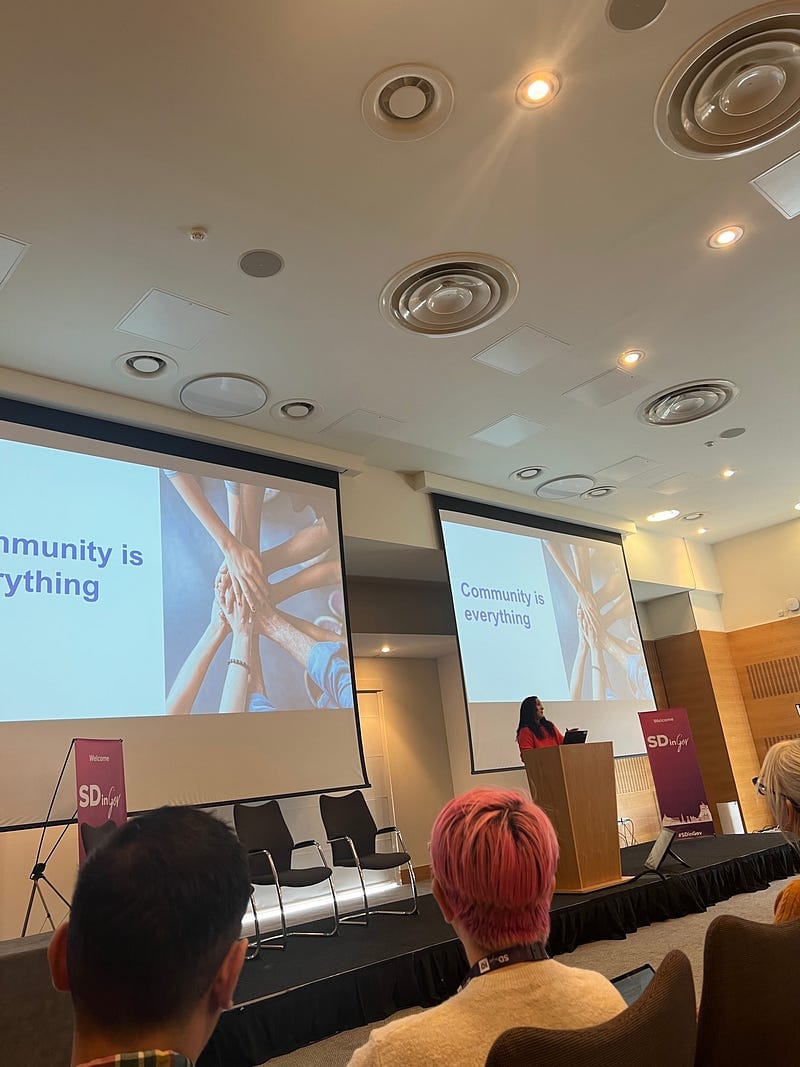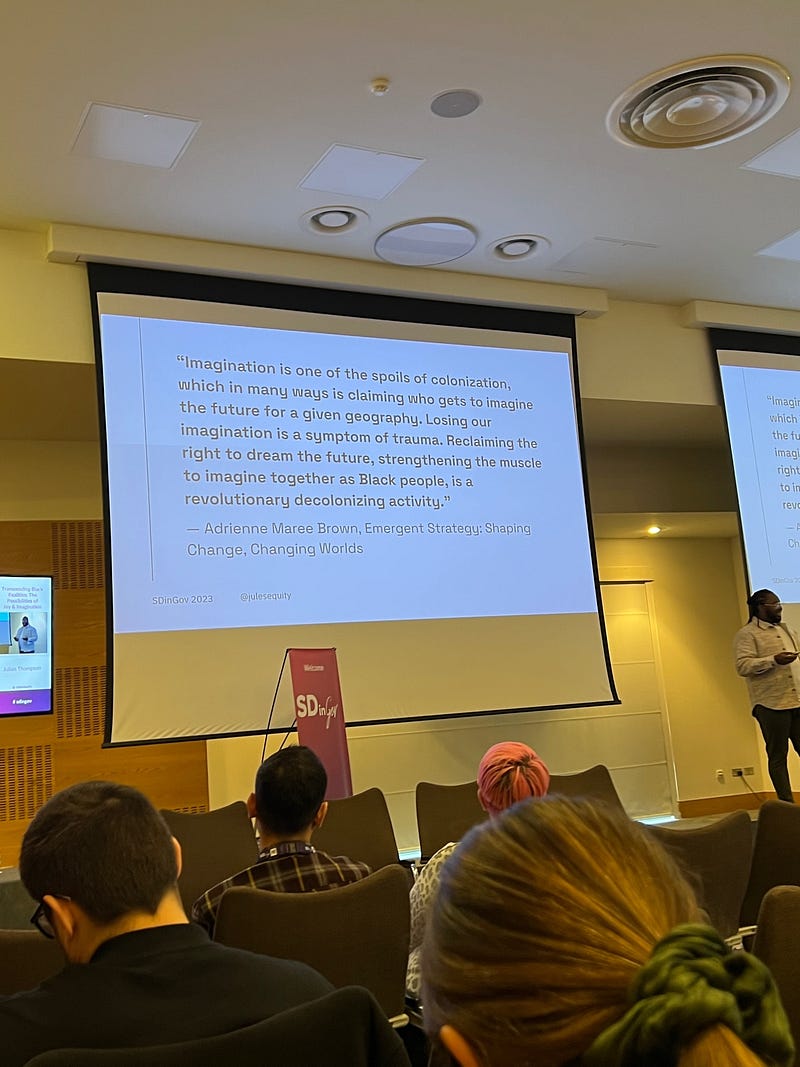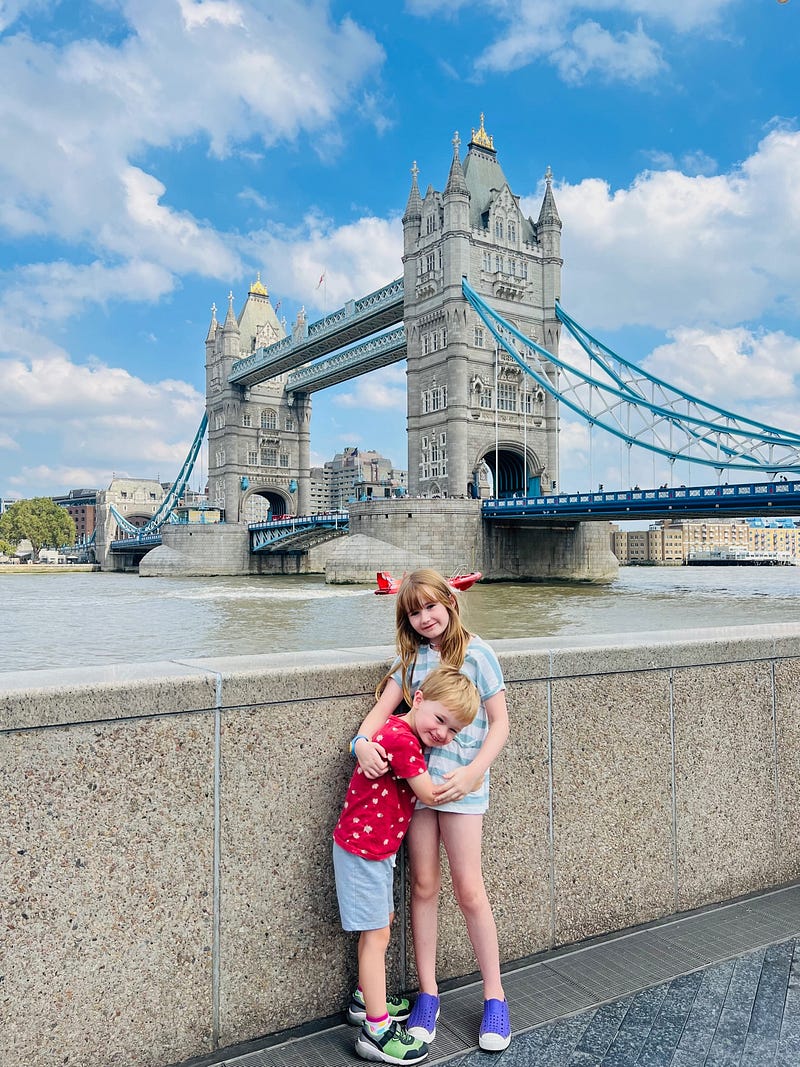#SDinGov weeknotes edition
Since my last Weeknote, my mind and my time have been dominated by the SD in Gov conference, so I’m using this edition to share my…

Since my last Weeknote, my mind and my time have been dominated by the SD in Gov conference, so I’m using this edition to share my experience and learnings.
I really enjoyed the conference — it’s such a warm and supportive atmosphere. I loved the keynotes, which were all so different and wonderful. At this conference, more than others, I felt torn between which sessions I wanted to attend but weren't necessarily as relevant to me, and which sessions would be more useful and relevant for me in this current phase of my career. I chose the useful sessions which I don’t regret but also do kind of regret, you know? Conferences are hotbeds of fomo.
These are the main themes I took away from the sessions I attended
(Bear in mind, I was looking for insights that were relevant to me in my specific phase of my career, and others who attended the conference were looking for other takeaways. So these will look different from the other attendees.)
Theme 1: Leadership and influencing change
- Steven Garrett from Sport England said something that really stuck with me: permission is not enough. Our leaders need to step up for designers. Real change happens from the bottom up and (not or) the top down (Kate said this.) For design to thrive, we need designers in leadership positions, who know how to support this work, not just leaders who say they care about design.
![Steven Garrett stands in front of a slide that reads: “permission is not enough. [you need] active (preferably enthusiastic) involvement; short, frequent two way communication; to be a clear and obvious priority; and more — and bigger — shovels”](https://www.marthaedwards.ca/content/images/2024/02/1-gfyfx_1oxa-x5gy1um0b1q-jpeg.jpg)
- We need to work to avoid snapback — where any change “snaps back” to the status quo. We should be working toward evolving into a new ecosystem. This idea came up in Kara and Martin’s talk, the long slog of public service design.
- The people who are most able to impact change have a deep understanding of how things work. Not just the design bits but everything — policy, tech, process etc. This came from Kate Tarling’s keynote but also came up in other sessions.
- Remember that progress is not linear. This came up in Kate Ivey-Williams’ talk, Embedding service design bottom up & top down — lessons from the field, and was mentioned in other talks as well.
- Decisions should be made by small groups. Don’t mistake governance for wider engagement/comms. This came up in Kate Tarling’s keynote and also a design government workshop I attended with Tory Dunn and Dave Broggio.
Theme 2: Communicating and storytelling
- Kate Tarling talk about how you communicate being as important as the work itself. A lot of problems are more about communications than decision making. She recommends keeping your presentations short: This, then this, then that
- Be careful not to make SD a buzzword or just another methodology/process. Frame it and speak about it in a way that makes sense to people. Focus on being service led. And use your words carefully — they’re sticky. This came from many talks but particularly Kate Ivey-Williams
- Design teams change over time. People come and go. It’s important to plan for this and to make sure you’re passing on the baton in a good way. Kara and Martin talked about this, and it also came up in Designing good services at scale: our experience of transforming public services across the UK with Isobel Seacombe and Marianne Brierley
Theme 3: How to keep going when it’s hard
- Always reflect on how far you’ve come. Kate Tarling and Kate Ivey-Williams both really emphasized this.
- Start small and tangible to show value, and continue from there. Kate I-W talked about this and it was something I touched on too in my talk.
- The perfect service, job, designer doesn’t exist. Let go of perfection. This came up many times but especially in Rochelle Gold’s keynote.
- Kate Ivey-Williams and Rochelle Gold (and me) reminded us that you can only do what you can do. Recognize that some things are out of your control.
- Community is the foundation on which this work can thrive or fizzle. This came up many times — in Kara and Martin’s talk of course, but in many others too including Rochelle’s keynote.
Theme 4: We need to repair imagination
Julian Thompson’s keynote gets a section of its own because it blew me away. It was the top highlight of the conference for me for many reasons, mainly because it really challenged how I see things. He says:
- We need to conceive new and alternative worlds, not just new ways to cope with the existing one.
- Our marginalized communities need more agency over how society works, and more alternatives for how society works.
- But to do this we need to reverse the effects that oppression has had on imagination
- We have to not only repair the existing challenges, but repair the imagination so communities can determine their own future.

Reflecting on the conference experience
In the spirit of weeknotes, I’m sharing my reflections from the last couple of weeks, which included the conference, my prep for the conference, and spending a week ahead of the conference in London.
What went well:
- I spoke at the conference and it went great. I’m actually really surprised by how relaxed and not nervous I was, and how smoothly it went. I think there are two reasons: It was my second time, so I felt at ease with the whole environment. Also, to give myself some credit (which I rarely do): I spent a lot of time preparing, rehearsing and referencing my talk. It paid off.
- The conference was extremely well-run. They had massages, a crafty corner, social events, sticker exchanges, quite rooms, a sound bath and so on.
- I got to chat IRL with some lovely people like Sam, Imran, Caroline, Louise, Pablo, Martin, Phil and so on. And I met some lovely new people too!
- I probably should have mentioned already that I brought my children (aged 4 & 8) with me. They loved visiting London and Edinburgh and seeing many family and friends. So many core memories were made on this trip.

What didn’t go as well:
- As much as I loved creating memories with my children, travelling with them was really hard work. I’d still do it again. But … I need sleep.
- At the end of the conference, I reflected to Caroline that I felt I had been alone for most of the conference. This isn’t necessarily a bad thing but I thought it was interesting. Coming from Canada, I didn’t have any colleagues I could buddy with (although I was fortunate to have lots of ex colleagues to chat to.) Also: Because I was travelling with my children, I wasn’t able to participate in the social events after the conference, and I felt a lot less chatty during the day because I had no downtime from being surrounded by people. Anyway, now that I’m a bit recovered from it all, I’m feeling a bit sad about being such a lone wolf. There were lots of people I wanted to say hi to, but didn’t have the energy to make the first move, and I’m annoyed with myself for missing that opportunity.
- I wished there was more online engagement during the conference, for instance on the slack channels. I also really wish this conference was more accessible for others who can’t attend (like all of my BC gov colleagues) through recordings or livestreams. I think this is a huge missed opportunity actually. This conference could really help change things if it was more accessible to people outside the UK.
- As I mentioned above, I didn’t like having to choose between sessions. Some time slots had several different talks I really wanted to attend but I could only choose one. Sometimes I regretted this. I wish all the sessions could have been recorded so I didn't feel like I was missing out.
Something I can’t stop thinking about
I love SDinGov and am so grateful I’ve had the opportunity to attend in-person twice and virtually once. I want this opportunity for everyone I work with, but it’s all but impossible to get permission to attend for most Canadian public servants. I think we need something similar in Canada or North America that is more accessible to us. Is anyone doing this? If not, should we?


Comments ()